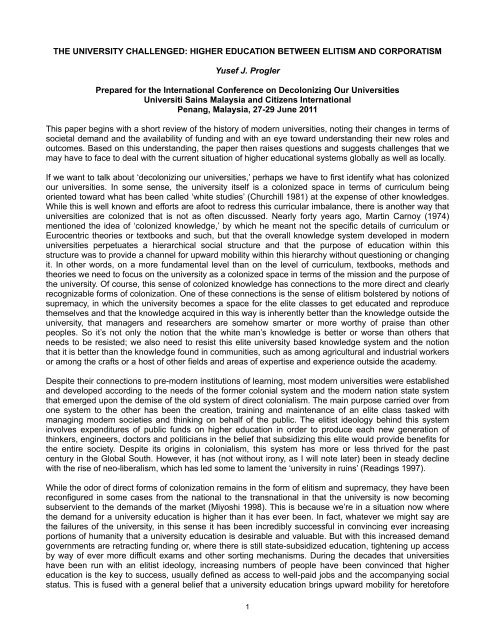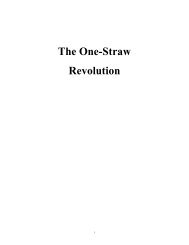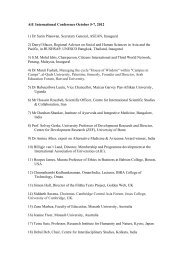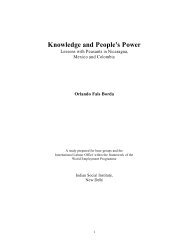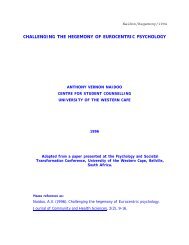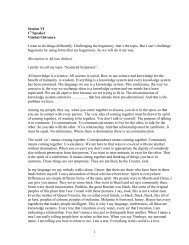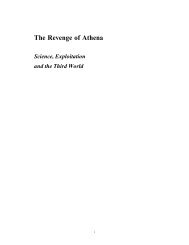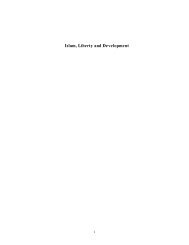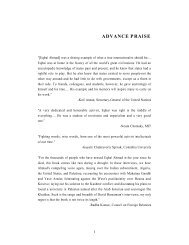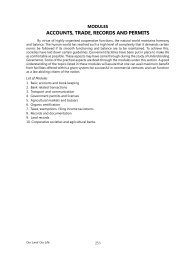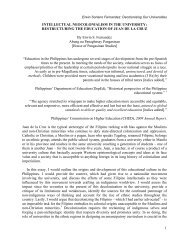HIGHER EDUCATION BETWEEN ELITISM AND ... - Multiworld India
HIGHER EDUCATION BETWEEN ELITISM AND ... - Multiworld India
HIGHER EDUCATION BETWEEN ELITISM AND ... - Multiworld India
Create successful ePaper yourself
Turn your PDF publications into a flip-book with our unique Google optimized e-Paper software.
THE UNIVERSITY CHALLENGED: <strong>HIGHER</strong> <strong>EDUCATION</strong> <strong>BETWEEN</strong> <strong>ELITISM</strong> <strong>AND</strong> CORPORATISMYusef J. ProglerPrepared for the International Conference on Decolonizing Our UniversitiesUniversiti Sains Malaysia and Citizens InternationalPenang, Malaysia, 27-29 June 2011This paper begins with a short review of the history of modern universities, noting their changes in terms ofsocietal demand and the availability of funding and with an eye toward understanding their new roles andoutcomes. Based on this understanding, the paper then raises questions and suggests challenges that wemay have to face to deal with the current situation of higher educational systems globally as well as locally.If we want to talk about ‘decolonizing our universities,’ perhaps we have to first identify what has colonizedour universities. In some sense, the university itself is a colonized space in terms of curriculum beingoriented toward what has been called ‘white studies’ (Churchill 1981) at the expense of other knowledges.While this is well known and efforts are afoot to redress this curricular imbalance, there is another way thatuniversities are colonized that is not as often discussed. Nearly forty years ago, Martin Carnoy (1974)mentioned the idea of ‘colonized knowledge,’ by which he meant not the specific details of curriculum orEurocentric theories or textbooks and such, but that the overall knowledge system developed in modernuniversities perpetuates a hierarchical social structure and that the purpose of education within thisstructure was to provide a channel for upward mobility within this hierarchy without questioning or changingit. In other words, on a more fundamental level than on the level of curriculum, textbooks, methods andtheories we need to focus on the university as a colonized space in terms of the mission and the purpose ofthe university. Of course, this sense of colonized knowledge has connections to the more direct and clearlyrecognizable forms of colonization. One of these connections is the sense of elitism bolstered by notions ofsupremacy, in which the university becomes a space for the elite classes to get educated and reproducethemselves and that the knowledge acquired in this way is inherently better than the knowledge outside theuniversity, that managers and researchers are somehow smarter or more worthy of praise than otherpeoples. So it’s not only the notion that the white man’s knowledge is better or worse than others thatneeds to be resisted; we also need to resist this elite university based knowledge system and the notionthat it is better than the knowledge found in communities, such as among agricultural and industrial workersor among the crafts or a host of other fields and areas of expertise and experience outside the academy.Despite their connections to pre-modern institutions of learning, most modern universities were establishedand developed according to the needs of the former colonial system and the modern nation state systemthat emerged upon the demise of the old system of direct colonialism. The main purpose carried over fromone system to the other has been the creation, training and maintenance of an elite class tasked withmanaging modern societies and thinking on behalf of the public. The elitist ideology behind this systeminvolves expenditures of public funds on higher education in order to produce each new generation ofthinkers, engineers, doctors and politicians in the belief that subsidizing this elite would provide benefits forthe entire society. Despite its origins in colonialism, this system has more or less thrived for the pastcentury in the Global South. However, it has (not without irony, as I will note later) been in steady declinewith the rise of neo-liberalism, which has led some to lament the ‘university in ruins’ (Readings 1997).While the odor of direct forms of colonization remains in the form of elitism and supremacy, they have beenreconfigured in some cases from the national to the transnational in that the university is now becomingsubservient to the demands of the market (Miyoshi 1998). This is because we’re in a situation now wherethe demand for a university education is higher than it has ever been. In fact, whatever we might say arethe failures of the university, in this sense it has been incredibly successful in convincing ever increasingportions of humanity that a university education is desirable and valuable. But with this increased demandgovernments are retracting funding or, where there is still state-subsidized education, tightening up accessby way of ever more difficult exams and other sorting mechanisms. During the decades that universitieshave been run with an elitist ideology, increasing numbers of people have been convinced that highereducation is the key to success, usually defined as access to well-paid jobs and the accompanying socialstatus. This is fused with a general belief that a university education brings upward mobility for heretofore1
marginalized social classes. While this might be true in some limited sense, the upward mobility of the fewhas resulted in the increased marginalization of the many who have gone through the same lengthy andvery costly process only to realize that the rewards at the end are few and far between. Nevertheless, thehope for success and mobility continues to increase demands for a university education, although the hopeis blinding to the fact that there is no similar rise in demand for the impending increase of graduates.Therefore, higher education has in many cases simply perpetuated the problem of K through 12 nationalschooling, leaving in its wake ever more of the ‘walking wounded’ who are graduated into a society that hasno need or place for them. At the same time, communities and families acting on the hope of upwardmobility and access to wealth and power through a university degree are coming under a greater burden inpaying for the education of their children, even while the prospect is often bleak of getting a job that leadsto a satisfying position and which provides enough income capable of paying back such a great investment.One tangible outcome of this increase in demand for higher education has been felt in the financial policiesimpacting universities, which have been emboldened by the neo-liberal ideology coupled with the belief thathigher education is no longer in need of public funds that can now be spent elsewhere. This has led tobudget cuts for higher education which in turn has pushed many universities to be run more likecorporations in that financial concerns and business slogans are beginning to replace traditional missionstatements. What matters now, in a crude economic sense, is survival of the fittest, meaning those that canraise their own funds. In other words, in many places the corporate university is now replacing the nationaluniversity. Readings (1997) has identified this as a shift away from the traditional research university to the‘university of excellence,’ with excellence taken here to be a vapid concept devoid of referential value butindicative of the mindset of the corporation. For Readings, the university of excellence has lost track of‘modernity’s encounter with culture.’ Others have described this shift in terms of universities increasinglyembracing an ethos of entrepreneurialism, that the term ‘corporate university,’ as employed by Aronowitz(2001), refers to a university that has adopted the ‘framework and ideology of the large corporation’ andwhich has prioritized the ‘application of accounting principles to academic employment and planning.’Distinct from a university run by a corporation, the corporate university is one that is run as a corporation.In light of this brief outline of the shift from the national to the corporate university, what remains is aconsideration of what it now means to be a university student or to work in higher education as a teacher,researcher or administrator. What are we doing in the roles we are playing? What are our expectations andthose of students, families and other concerned parties? Considering our personal limitations as well as theunfolding situation, what options are there to effect an active and constructive role in this situation? Shallwe envision a utopian system of higher education and work towards that? Or do we want to preserve thingsthe way they were in the past, or perhaps protect the structure while changing the content and curricula?In his discussion of ‘education in spite of postmodernity,’ Zygmunt Bauman (2001) has noted that while inthe modernizing countries universities ‘may still play the traditional role of factories supplying a heretoforemissing educated elite,’ universities in the West will need to ‘rethink their role in a world that has no use fortheir traditional services, sets new rules for the game of prestige and influence, and views with growingsuspicion the values they stood for.’ Bauman also observed that universities have become slow to respondto the unpredictable and hyper-changing worlds of ‘liquid modernity.’ For instance, by the time graduatesfinish a degree the knowledge they gain may already be obsolete. Meanwhile, he laments, after the‘scientifically assisted horrors’ of the twentieth century our faith in the humanizing potential of the modernWestern sciences ‘seems laughably, perhaps even criminally, naïve.’ While many nineteenth and twentiethcentury traditions used to be coveted assets for creating meaning in modern research universities, they arequickly becoming liabilities in a more fluid and tentative world. Bauman suggests that universities candevelop responses to this emerging global disorder and perhaps maintain their sense of meaning andpurpose by developing a diversity of opinions, methodologies and curricula as necessary survival features.However, he does not address what kind of institutional structures might be required to bring this about.Recent economic trends in higher education, in which governments have retracted and reduced funding forhigher education, have posed challenges for academics. In particular, as corporate universities adopt a‘student as customer’ approach to solving financial problems, class sizes and teaching loads areexpanding. This has given rise to various strategies employed by university professors tasked with teachingthese courses. We can illustrate these strategies through a brief tale of two teachers. Teacher one creates2
artificial scarcity by intimidating students to reduce class size and then guiding the remaining small andelite body toward graduate programs in the Global North, reveling in the ability to gain access for a limitednumber of students in these elite institutions while at the same time artificially maintaining small class sizesat the expense of his colleagues who end up taking up the slack. This teacher justifies this strategy throughrecourse to the quality argument. Unlike this elitist colleague, our second teacher accepts the duty to teachhundreds of students in a single lecture, bowing to the quantity demands of the corporate university, butgives them an easy ride by using exams that everybody, regardless of the course content, can easily pass,providing questions in advance, practicing social promotion, and creating a new social contract based onmutual agreement to not make waves or require or achieve much. Despite teaching being one of the maintasks of a university professor today, owing to the increased demand noted above, each position providesrelief from teaching one way or another; perhaps we can say that the latter is a populist response and theformer an elitist response. As a result, both teachers gain more time for pursuing research interests andwriting grants, which are often still highly valued, especially in the elitist universities. More importantly, bothpositions are responses to an emerging trend in higher education that gives pause for reflection on ourroles in the academy. Our first teacher laments the ‘low quality’ students and seeks to retrench the elitismof the colonized academy but which ignores or undermines hard won gains by women, people of color andethnic or religious minorities, or the struggles of the poor and marginalized that have opened the academydoors to a broader cross section of humanity than ever before in history. This could even be seen as a gainor a victory against the exclusivity and elitism of the colonized university, unless the curricular issues notedabove mean retrenching the elitist impulse through demands for inculcating one or another national canon.Of course, there is one possible way to solve much of this problem, which is to close fifty, sixty, or seventypercent of the universities to rebalance the scarcity issue and bolster the elitism. But that would just feedback into the old forms of classical colonization. Rather than that, some may suggest going in the otherdirection by opening up the academy completely to everybody, which would solve the quantity problem atthe expense of the quality issue. Or, perhaps rather than dichotomizing, there needs to be ongoing dialogbetween civil society, NGOs, the world of work, families and other institutions and the university, so that theuniversity could become more aligned with those sectors of society. Actually, this is what Clark Kerr (2001)proposed in his idea of the Multiversity in the 1960s, a proposal that was roundly despised by universityacademics of the day and which remains severely criticized even forty years later. Why? I think it’s becausea lot of university academics are still operating in the elitist model. But the valid criticism of Kerr’s proposalfor a Multiversity is that what he really meant was corporations, as a sort of advocacy of a proto- or crypticcorporateuniversity before we recently named it as such. But if we broaden that vision of the universitybeing accountable not just to monied corporations but to civil society, to NGOs, to volunteerism to normalemployers, then perhaps we can redeem that initial idea of the Multiversity as responsible to society andoverlay that with our idea of Multiversity, which is really about re-introducing marginalized voices into theacademy, thus redressing both the institutional as well as curricular imbalances in higher education today.Actually, to many players closing the requisite number of universities to redress imbalances might seemlike a fast solution to this problem. Many academics more inclined toward research than teaching would behappy to be in a position to only teach future clones of themselves, training the next elite of researchersand managers, as noted in the above tale of two teachers. But this seems unlikely, given the strong publicbelief that a university education can open doors for economic and political opportunity and provide somechances at upward mobility. Beyond that, universities remain one of the few semi-public spaces dedicatedto learning, for better or worse, so to close them down or turn them over to the rich might strike others asimmoral. Another option would be to make universities more competitive through ever increasingly difficultplacement exams and more stringent entrance requirements, but the resulting downside, given the demandfor a university education, is likely to create more walking wounded. Subsidizing universities, as is still donein many parts of the Global South, may seem like an option, but this gets complicated by the ever-presentprospect of brain drain, with the struggling corporate universities of the Global North enticing the elite of theGlobal South with their subsidized educations to supplement their dwindling domestic enrollments or toprovide workers for their own aging societies to keep social security systems afloat or, more crudely, totreat international students as ‘cash cows.’ In fact, this is becoming a matter of policy in the Global North,as evidenced by recent statements from the US House Republican Technology Working Group on ensuringAmerican access to the best workers: ‘We will examine current education programs to make sure they areoperating efficiently. We will also examine current visa and immigration laws to make sure we attract and3
ReferencesAronowitz S. The Knowledge Factory: Dismantling the Corporate University and Creating TrueHigher Learning. Beacon Press, 2001.Bauman, Z. The Individualized Society. Polity Press, 2001.Carnoy, M. Education as Cultural Imperialism. David McKay Company, 1974.Churchill W. ‘White Studies: The Intellectual Imperialism of U.S. Higher Education,’ Equity and Excellencein Education, Vol. 19, Nos. 1 & 2, January 1981, pp. 51-57.Cole, J. R. The Great American University: Its Rise to Preeminence, Its Indispensable National Role, Why ItMust Be Protected (New York: Public Affairs, 2010).Freire, P. Pedagogy of the Oppressed. Continuum Books, 1970.Goodhall, A. H. Socrates in the Boardroom: Why Research Universities Should be Led by Top Scholars(Princeton University Press, 2009).Hacker, A. & Dreifus, C. Higher Education? How Colleges are Wasting Our Money and Failing Our Kids,and What We Can Do About It. St. Martin’s Press, 2011.Kerr, C. The Uses of the University. Harvard University Press, 2001.Kianinejad A. A Socio-Economic Analysis of Higher Education in Iran. Bulletin of the Faculty of HumanDevelopment, Kobe University, Vol. 14, No. 2, March 2007, pp. 41-48.Kincheloe J. L. Toil and Trouble: Good Work, Smart Workers, and the Integration of Academic andVocational Education. Peter Lang Press, 1995.McLean M. Pedagogy and the University: Critical Theory and Practice (London: Continuum, 2006).Miyoshi, M. Globalization, Culture and the University, in Jameson and Miyoshi (Eds.) The Cultures ofGlobalization. Duke University Press, 1998.Nussbaum, M. Cultivating Humanity: A Classical Defense of Reform in Liberal Education (HarvardUniversity Press, 1997).Nussbaum, M. Not for Profit: Why Democracy Needs the Humanities (Princeton University Press, 2010).Progler, J. Curriculum Reform in the Corporate University: From the Disciplines to Transferrable Skills.Social Systems Studies, Vol. 21, September 2010, pp. 95-113.Readings, B. The University in Ruins. Harvard University Press, 1997.Yusef J. Progler teaches Comparative Cultures and Societies at Ritsumeikan Asia Pacific University inJapan, where he is also Associate Dean of the College of Asia Pacific Studies and has previously servedas academic field leader for a new program in Media, Culture and Society. He recently published Books ForCritical Consciousness: Forty Reviews with Citizens International, and currently manages TV Multiversityfor the MultiWorld Network (http://tvmultiversity.blogspot.com). Progler has also worked in the United ArabEmirates at a national women’s university, where he served as campus chair for International Studies andhelped implement the World Humanities and Global Studies courses for the university’s undergraduategeneral education program. Prior to leaving the US in 2000, he worked in secondary social studies teachereducation and managed internships at Brooklyn College in the City University of New York. He is currentlyarchiving some of his writings at http://progler.blogspot.com and can be reached at jprogler@gmail.com.5


